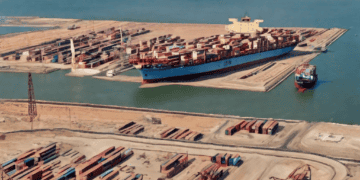An Overview of the Current Situation
Recent geopolitical tensions in the vicinity of the Suez Canal, primarily due to Houthi assaults in the Red Sea and escalating conflicts in the region, are casting a long shadow over global shipping and international trade. These developments have significant implications for supply chains worldwide, potentially leading to widespread disruptions, product scarcities, and escalating prices. This analysis, drawing insights from Gregory D. DeYong, an associate professor of operations management at Southern Illinois University Carbondale, delves into the nuances of this critical issue.
Suez Canal’s Pivotal Role in Global Trade
The Suez Canal, a crucial maritime artery, handles approximately 12% of global trade, with a significant portion of this traffic being container shipments. These containers are predominantly filled with consumer goods, reflecting the canal’s vital role in facilitating the flow of products from southeast Asia to European markets. However, the recent geopolitical instability has prompted several shipping companies to reroute their vessels, avoiding the Suez Canal and seeking alternative pathways, despite the canal’s status as the most expedient maritime link between Asia and Europe.
Exploring Alternative Shipping Routes
Professor DeYong highlights several alternative routes, each presenting unique challenges:
- The Northern Sea Route: Traversing the north coast of Asia and Europe, this route is often hindered by ice, particularly during winter months.
- Land Routes through Russia and Eastern Europe: These routes, mainly rail-based, are currently hampered by the ongoing Ukraine-Russia conflict and are limited in capacity and time efficiency.
- The North American Landbridge: This option involves extensive land transport across Asia, the U.S., and Europe but is constrained by the high demand at U.S. ports.
- The Cape Route: Circling south around the Cape of Good Hope and Cape Agulhas, this remains the predominant alternative despite significantly higher costs and longer transit times.
Implications of Route Diversions
The diversion to alternative routes not only doubles the transit time but also incurs higher fuel costs and shipping rates. This increase in operational costs has a ripple effect on global shipping capacity. The need for additional capacity to accommodate Asia-Europe shipments could strain the existing global container capacity, which currently has a marginal excess of 10-15%. Should the instability in the Red Sea and Suez Canal persist, this excess capacity might be insufficient, leading to escalated container rates, potential space shortages, and subsequent shipping delays.
Additional Challenges: The Panama Canal
Compounding these challenges is a severe drought, influenced by a strong El Niño climate pattern, which has critically affected the Panama Canal. The Panama Canal Authority has been compelled to limit the number of daily ship passages, exacerbating global supply chain disruptions. Although some modern vessels exceed the size limits of the Panama Canal, this reduction in canal traffic further strains global shipping logistics.
Professor DeYong’s Expertise and Initiatives
Bringing a blend of academic insight and practical experience, Professor DeYong, with his background as an import/export manager overseeing substantial product volumes, is at the forefront of efforts to understand and mitigate these supply chain challenges. He is actively involved in establishing a Center for Supply Chain Management and Logistics at SIU’s College of Business and Analytics, aiming to develop solutions and strategies to navigate these complex global trade dynamics.
















